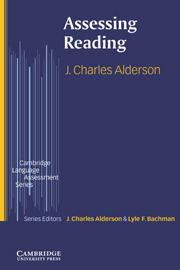Book contents
- Frontmatter
- Contents
- Series Editor's Preface
- Acknowledgements
- Abbreviations
- 1 The nature of reading
- 2 Variables that affect the nature of reading
- 3 Research into the assessment of reading
- 4 The reader: defining the construct of reading ability
- 5 A framework for test design
- 6 Tests in the real world: test purposes
- 7 Techniques for testing reading
- 8 The development of reading ability
- 9 The way forward. Assessing the interation between reader and text: processes and strategies
- Bibliography
- Index
6 - Tests in the real world: test purposes
Published online by Cambridge University Press: 03 May 2010
- Frontmatter
- Contents
- Series Editor's Preface
- Acknowledgements
- Abbreviations
- 1 The nature of reading
- 2 Variables that affect the nature of reading
- 3 Research into the assessment of reading
- 4 The reader: defining the construct of reading ability
- 5 A framework for test design
- 6 Tests in the real world: test purposes
- 7 Techniques for testing reading
- 8 The development of reading ability
- 9 The way forward. Assessing the interation between reader and text: processes and strategies
- Bibliography
- Index
Summary
Introduction
In Chapter 4 I discussed how constructs of reading have been defined and operationalised. At the end of Chapter 5 I also briefly touched upon aspects other than task characteristics that the development of a test needs to address, namely a definition of what reading ability might be (or language ability applied to written texts, as Bachman and Palmer might prefer). In practice, of course, we have been addressing the issue of the construct of reading throughout this book so far, and we will return to this topic in later chapters, too.
In Chapter 5, I identified a number of task characteristics, initially in target language use domains, using the Bachman and Palmer terminology, and then by extension in test tasks, which need to be taken into account when designing reading tests and assessment procedures.
In this chapter, I present a number of situations in which reading is assessed in relation to uses (i.e. inferences about reading ability, decisions about individuals) that are made based on information from tests or assessment procedures. As already promised in Chapter 1, we shall look at a number of real–world needs for the assessment of reading. First, however, we need briefly to consider the various stages in test development.
Information
- Type
- Chapter
- Information
- Assessing Reading , pp. 167 - 201Publisher: Cambridge University PressPrint publication year: 2000
